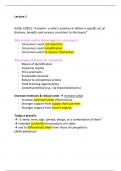Samenvatting
Samenvatting - International Brand Management (MAN-MMA035A) (Radboud University)
Deze samenvatting omvat alle onderwerpen die behandeld zijn tijdens de colleges van het vak International Brand Management. Het bestuderen van deze samenvatting heeft geresulteerd in het behalen van een 7 voor mijn tentamen.
[Meer zien]




